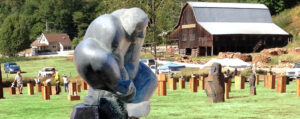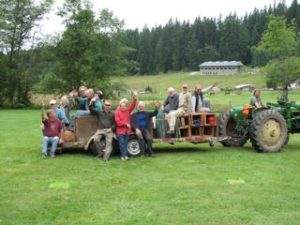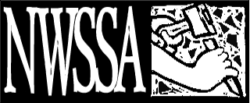Home » NWSSA Events » Shows » Past Shows » Camp B 2000 – Sept/Oct 2000
Through the years, we all have wondered what life would be like in the year 2000. A fitting beginning to a new century, this year’s Camp Brotherhood Symposium offered the wonder-filled balance of insight and technique which we have all come to expect from this gathering. Held from June 14-23 at Camp Brotherhood in Mt. Vernon, WA, this was the most-attended symposium yet. This year’s Camp Brotherhood fulfilled many of our imaginings.
During our lunch break one afternoon, a beautiful bald eagle flew toward us, skimming the entire length of the field; an auspicious messenger of the new millennium. At night the full moon poured over the trees and illuminated the open bowl of the field and mysteriously fueled people as they talked around the warm orange fire late into the night.
Whether you’ve been attending for years or have just discovered this amazing “reunion” of Camp Brotherhood, the most important part that stays in your mind and heart is the joy of being able to talk, work, live, and eat together and share our sometimes irrational passion for making stuff in stone. It’s a connection rarely experienced elsewhere in the world, this gathering of stone artists. Friendships that begin at Camp Brotherhood become life-long stonesculpting bonds that are stronger than any epoxy known to mankind.
This year was exceptional.
About 100 kindred stone carving folks gathered this year, staying the whole 10 days or for part of the time. Seventeen first-time attendees were wonderfully overwhelmed by the choices of diverse workshops, vendors with great stone and tools, and inspirational evening programs. Some of the new workshops this year helped to make an outstanding Symposium, from the practical hands-on instruction to the inspirational and mind-challenging group projects. The evenings around the camp fire warmed many of us with bellyaching jokes and stories and surprisingly good drumming.
Simone Weber-Luckham co-taught the five-day Introduction to Stone Carving workshop with Alfonso Rodriquez Medina. She walked students through the basic types of stone (with our resident geologist Ron Geitgey by her side), outlined hand tools, and taught and demonstrated carving techniques. Students were impressed with her unique wooden mallet and steady rhythm pounding method and how knowledgeable Simone is from her years of professional experience, traditional European training, and apprenticeship.
Alfonso Rodriquez Medina journeyed from Lima, Peru for his second year at Camp Brotherhood. This year as an instructor, Alfonso’s obvious expertise and skill shone through as he taught with a translator or gave one-to-one instruction through demonstration. People are still raving about his hand-tooled lettering technique and toolmaking with a forge. Whether we were in the Introduction workshop or not, many of us were graced with Alfonso’s input, assistance, and encouragement throughout the Symposium. We were touched by his generous gifts to the auction, one of which was a beautiful white marble piece of two loving faces. David Firman’s two superb drawing classes over a six-day span approached the human figure and portraiture. Between his passionate teaching style and his tangible and accessible methods for drawing, these classes were great for both the beginner and the experienced artist. He almost guarantees that he can teach anyone to draw, and although few may be as talented as David in this skill, we hope he’ll be able to continue to help us with our humble attempts of drawing.
Sabah Al-Dhaher taught a five-day Figurative Workshop. He began with a life drawing and sculpting session to help us to visualize and form the figure with the immediate gratification of a clay piece. As we moved to a large raw stone and through the steps of roughing out a piece, we appreciated Sabah’s decisive, flowing, and focussed approach toward the human form. He makes sculpting the human form out of marble look as easy as a figure skater spinning across the white ice in the Olympics. Instead of being remote, Sabah’s gentle and direct style of teaching helped us to know that we can always sculpt the figure or face by using the constant reference of our own human form.
The Concept Development, Hands-on Workshop and Large Scale Sculpture were combined this year and facilitated by Rich Hestekind and Michael Jacobsen. These two presented a “contest” for working in small groups on large outdoor public commission pieces. Participants were given professional and interpersonal obstacles to overcome, specific materials to work with, competitive tension between the four groups, as well as a deadline to meet. The large sculptures of styrofoam, sheet metal and wooden 2 x2 ‘s, were a pleasure to enjoy for the three days after completion. This workshop was very gratifying, where everyone “won” and it proved to be a very effective realty-exercise on public art commissions.
The joyous and talented Michael Jacobsen taught a Moving and Uplifting Workshop that took us from moving an armful-sized rock up to workbench height and loading it into a car, to using a forklift to raise two huge pieces of granite to a vertical standing position. Michael helped us use our minds to move things much heavier that our vulnerable bodies could lift, employing wedges, crowbars, levers, cribbing (blocks of wood), hoists, come alongs, and forklifts. An insightful tip he shared was the use of sand sprinkled on a ramp to ease a heavy rock down a ramp. Michael helped us all to realize that we could out-clever a heavy rock. It may be slow going, but it is possible!
Joanne Duby was enthusiastic and diligent as she taught a multitude of basing and polishing workshops. The feedback, as always, is “more Joanne Duby”. People can’t get enough of Joanne’s breadth and scope of proven and tested techniques. Whether you’re a first time attendee or have been attending for years, everybody’s combined stone experience barely compares with Joanne’s expertise. In her own work, she pushes the edge of what stone can do — almost defying that it is a hard material — by the fluidity and grace in her sculptural forms. In her workshops demonstrating drilling and basing, finishing and polishing, power tools seem like a natural extension of Joanne’s body. It’s a joy to see her in action. We saw more of power tools in Tom Urban’s Power Tool workshop. These four days were well attended by those of us who can never get enough of power tool options. Tom transported his well-tooled studio for an informational overview as well as talks on specific tools and their advantages and unique capabilities. Tom’s knowledge about these tools was broad and versatile, covering electric and pneumatics, from the massive to the small detailing tools.
To prove how serendipitous the Symposium can be, this year the jovial George Pratt stepped in to not only instruct how to use the grinding and polishing tool stationed in the pavilion, but also was a tremendous wealth of information in his unpublished hour-long series of classes. George filled our heads with overflowing amounts of life-tested wisdom from hand tool technique to power and air tool technique. His abundance of knowledge made many of us appreciate the generosity of George’s experience and his many tips and suggestions. If only we can remember them when we need them at home in the studio!
Hon Lee prepared an astounding collection of slides of sculpture this year. The focus of his 3-hour art history lecture was Chinese Art for the Past Millenium. Spanning from 4700 BC to 900 AD, Hon Lee outlined some basic shape vocabulary: Pi – a stone donut shape. Cong – a square with a circle vessel. Hung – partial circle. We saw beautiful jade carvings and learned how jade was a material used for tools which was cut with sand guided with a cord and heated to change it’s hardness and consistency. The room was packed with people writing pages and pages of notes and enjoying the exquisite quality of slides and the flowing river of detailed information that Hon Lee offers to us. We are so honored to have Hon Lee share with us from his vast knowledge base of study, travel and research. He must have warehouses of archival slides because he has never repeated himself with information or images in the years that he’s been gracing us with his expertise and scholarly wit. Hon Lee shares his personal and professional appreciation and passion for sculpture and as a member of the NWSSA community. It was a particular treat this year, to have Hon Lee share slides of his sculpture photograghed in their indoor and outdoor settings.
The evening slide presentations, facilitated by the eloquent and humble Rich Hestekind, were an opportunity for instructors to share and discuss their work. We were inspired and moved by the tremendous talent of the members of our Symposium community.
This year’s auction was a great success, thanks to everyone who contributed either in the form of donated art, materials, things around the house and in the form of purchases and cash contributions. This auction makes it possible for several work study positions to be available the following year at Camp Brotherhood.
The annual Camp Brotherhood Symposia serve to unite us in our art and to help each of us grow not only to be better artists, but better members of our unique corner of the art community. Each and every one of us contribute and important part of making Camp Brotherhood the wonderful event that it is – simply by being ourselves. We look forward to seeing all of you at “Camp Brotherhood 2001”.






We need some kind of descriptive text here.